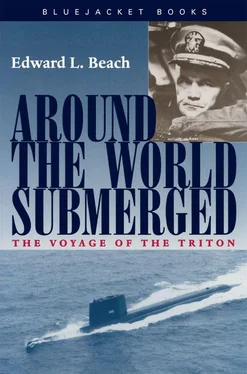In the meantime, we had been looking for the sun in hopes of getting an observation. No luck. If there were an unexpected current or, during the last thirty-six hours, a slight error in our dead-reckoning position, it would be more than easy to skid right by this tiny island a few miles either way and never see it. My good friend Fred Janney, navigating the Whale during the war, once missed Midway Island in exactly this manner, and had to spend half a day, with his grumbling crew, groping about looking for the tiny atoll. (I have never let him forget the episode, and he will not be happy to read about it here.)
At 1156, Adams announced St. Peter and St. Paul’s Rocks should be eleven miles dead ahead. Again we brought Triton to periscope depth, and at 1206 I saw a tiny white spot on the horizon bearing exactly two degrees to the left of dead ahead. For the Rocks to show up so precisely on schedule, from dead-reckoning navigation alone, was an indication of Will’s great ability.
As we approached the islet, it presented varying shapes. The white spot looked at first like the sail of a ship, then like a sun-kissed minaret, finally like a huge birdcage. At last I recognized it as the structure of the abandoned lighthouse. The upper parts of the rocks were pure white from bird droppings, and the lower levels, as we approached, were a sort of brownish-black, ceaselessly washed by the waves. The sea was relatively smooth, yet there was considerable surf breaking in and among the rocks, foaming madly like a miniature waterfall one minute, stopping abruptly the next and reversing itself. As we came closer, we could distinguish a great number of granitelike outcroppings scattered about everywhere, and there were large numbers of sea birds.
The whole scene reminded me of a photograph published after the Battle of Midway, which had shown a Japanese cruiser, the Mikuma, after she had received a tremendous drubbing from our carrier-based aircraft. By squinting a little and using a bit of imagination, St. Peter and St. Paul’s Rocks in profile looked exactly like His Imperial Japanese Majesty’s ship, Mikuma.
We certainly had to agree to one thing: the Sailing Directions description of this place was exactly right. As a matter of fact, its barrenness had been one of the arguments in favor of selecting it for the official terminus of the circumnavigation. German submarines had been in the habit of stopping at the Rocks, during World War II, to exchange mail, supplies, and munitions. For them, as for us, the Rocks were a convenient navigational reference point and also, no doubt, a concealing backdrop should a strange ship unexpectedly appear on the horizon.
We took a lot of photographs and went through a complete photographic reconnaissance drill. For three-and-a-half hours we cruised slowly about at various ranges, conforming to the bottom topography and carefully avoiding shallow spots. Everyone who wanted to do so was permitted to come to the conning tower for a look, and many crew members availed themselves of this opportunity.
Not a single engineer came forward, however, for Don Fears had taken advantage of our time at reduced speed to make some minor repairs and some low-power checks on various machinery. Mindful of our experience with the condenser, and not one to neglect a chance of this sort anyway, he used every available hand.
At a few minutes after 1600, we turned Triton south and headed for Cape Horn. The equator was only fifty miles away.
For the last two or three days, there had been a steady effort by the Shellbacks to exaggerate the various tortures that would be inflicted on the lowly pollywogs when we crossed the equator. Among our pollywogs, who composed most of the crew, were some apparently made of fairly stern stuff. One obnoxious character, calling himself the Little Gray Fox, attempted to foment a rebellion. He posted signs reading “Pollywogs arise” and “shellbacks take heed and surrender while you may.” And King Neptune’s crown, the equipment for the Royal Barbers, and the painstakingly made shillelaghs for the chastisement of the guilty pollywogs mysteriously vanished. A thorough investigation by the Shellbacks uncovered the information that their paraphernalia had disappeared permanently through the garbage ejector.
I remembered vaguely having given permission to flush the garbage disposer while we were cruising about the Rocks, and I suppose I had been an unwitting accomplice to a foul deed.
At a few minutes after eight in the evening, we hit the equator. There was a grinding jolt from somewhere forward (which sounded suspiciously like a torpedo tube full of water being fired, which, of course, I knew it was, having given the required permission to shoot it). A confused report, broken off unfinished, came over the ship’s announcing system, and shortly after, I received a note that King Neptune and his Royal Court had arrived on board and desired my presence in the crew’s mess hall.
Buckling on my sword and putting on my cap for the occasion, since undue informality would, of course, have been unseemly—and possibly would have resulted in even sterner measures being visited upon the unworthy pollywogs, for whom I felt the deepest sympathy indeed—I headed for the appointed place.
Neptune, when I met him, looked suspiciously like Loyd Garlock, who had crossed the line with me in the Trigger eight years before. The Royal Queen, half a head taller than he, with brilliant red lips, long stringy curly hair (which was not surprising since it came from a floor mop), and smoking at all times a long black cigar, might have been Torpedoman Second Class Wilmot A. Jones.
The Queen’s bosom (which some of her friends seemed to think ought to be pronounced “buzzoom”) looked to me like a pair of strategically slung grapefruit, but of course my imagination was probably working overtime and I knew I should resolutely put aside such unworthy thoughts. Someone considerately handed me a piece of paper containing a typed and smudged script, with the assistance of which, and with a little ad-libbing, the following colloquy ensued:
MYSELF: Unless I miss my guess, sir, you and I have had the good fortune of meeting before.
KING NEPTUNE: Many pass through my kingdom, Captain, and I never forget a face, but I’ll be surfaced if I recall yours. Davy Jones, check the records on Captain Beach here to see if he really is one of my own.
DAVY JONES: Your Majesty, the records show that if you’re a Shellback then so is he. [That Davy Jones is a good man, but this was a low blow on the part of Neptune.]
NEPTUNE: Ah, quite so, Davy. And now that you mention it, I recall he crossed the equator as if it were yesterday. My, he’s gained a little weight here and there, hasn’t he!
MYSELF: Speak for yourself, your subnormal Majesty! And now, may I have your Majesty’s permission to introduce you and your royal retinue to those of my crew who have never had the displeasure?
NEPTUNE: Permission granted, Captain. And by the way, sir, would you mind standing just a bit straighter, and use a little more reverence in my grandiloquent presence?
MYSELF: A thousand pardons, your Horrific Magnificence. Men, once again it becomes my great privilege to introduce the ruler of the Mangy Mane, I mean Raging Main, Neptunus rex and the members of his Royal Family, including Her Majesty, the Queen, the Royal Babe, the Royal Scribe, the Royal Concubine, the Royal Prosecutor, the Royal Sea Lawyer, the Royal Barbers, Dentist, Baker, High Sheriffs, and their mighty company.
NEPTUNE: Thank you, Captain. It’s a pleasure to be aboard your ship and see so many familiar faces again. And Captain, before I forget it, would you do what you can about those blasted propellers of yours? Kept the mermaids up all night last night.
Читать дальше












